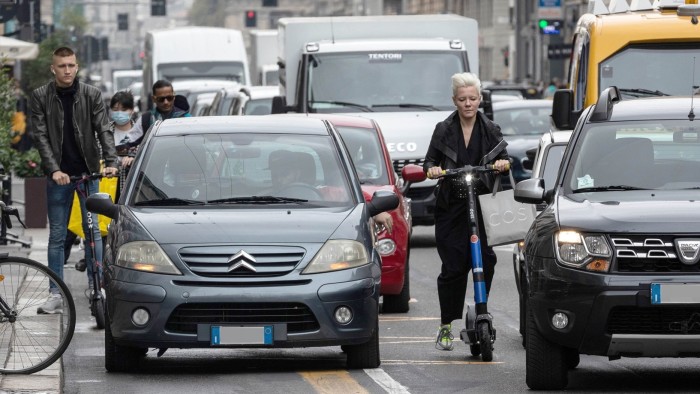Italy puts brakes on ‘reckless’ e-scooter use with new helmet and insurance rules

Unlock the Editor’s Digest for free
Roula Khalaf, Editor of the FT, selects her favourite stories in this weekly newsletter.
Italy will require people riding electric scooters to wear helmets and carry insurance to clamp down on what the Italian government describes as “reckless behaviour” that has turned streets into a “jungle”.
The Italian parliament on Wednesday approved the new rules, which will enter into force after the president signs off on the law. But dismayed e-scooter operators, such as Uber-backed Lime, US-based Bird and Franco-Dutch Dott, warned that the new conditions will seriously depress demand in one of the most important European markets after Paris banned the two-wheelers in a referendum last year.
“It’s implicit sabotage,” said Andrea Giaretta, vice-president for western Europe at Dott, which has 9,000 e-scooters across 20 Italian cities and towns. “These rules are unworkable. It will boomerang . . . and make sharing less sustainable.”
Giorgio Cappiello, head of public affairs for Bird Italy, called the new rules “completely ideological” and warned they could reduce demand for the company’s 15,000 e-scooters in Italy by up to 70 per cent, jeopardising their future.
“As in all industries, if the regulatory framework is hostile for private companies, they leave,” he said.
Italy has about 55,000 e-scooters available for rent in cities and towns, offering what advocates call an affordable, green transport option. Favourable weather and high volumes of tourists have led to rapid growth of the sector.
But the proliferation of two-wheelers has also triggered a backlash, especially in tourist hubs such as Rome, where e-scooters are left scattered on narrow pavements, and riders weave amid traffic congestion.
Accidents involving e-scooters have been rising steadily, with 21 people killed last year and 182 pedestrians hit — compared with just nine fatalities and 127 injured pedestrians in 2021 — according to Istat, the national statistics agency.
About half of e-scooter accidents recorded each year involved foreign riders — mainly tourists and migrants working for food delivery services, Istat said.
Transport minister Matteo Salvini has vowed to tackle what he called a “jungle in the streets” created by e-scooter driving. He said the new rules would “end impunity and reckless behaviour” with an eye to public welfare.
“Everyone’s lives and safety depend on it,” Salvini wrote in a social media post earlier this week.
Under the new law, all e-scooter riders will be required to wear helmets — bringing them in line with what Vespa and other moped riders have had to wear since 2000.
Operators said this was likely to reduce usage by 25 to 70 per cent, given the challenges of providing helmets, which they argued were unnecessary given that the e-scooters cannot travel above 20km per hour.
“On a scooter you can’t attach a helmet — we wouldn’t know where to put it,” said Dott’s Giaretta, adding that most accidents “do not involve the skull but the face, legs, arms and abdomen”.
Enrico Stefàno, a senior public policy manager for Lime — which operates 10,000 e-scooters in 12 Italian cities, said the company could attach helmets to scooters at an initial cost of about €1mn.
But he said that e-scooter use would probably drop by about 25 per cent as the helmets would be tempting targets for theft, and be easily damaged or vandalised.
“In the short-run this can translate into fewer rides,” Stefano said. “We don’t want to leave Italy or disinvest or lay off anyway, but it’s clear that this is a measure that has an impact.”
Italy will also require e-scooter riders to carry third-party liability insurance to cover pedestrians and others hurt in accidents, which shared-mobility companies said would be more costly than the coverage they now provided for users.
Andrea Giuricin, a transport economist at the University of Milan-Bicocca and a consultant to the sector, said operators would continue lobbying to ease the law, even after the bill’s adoption.
“Due to the fact that they are global players, they will continue to operate making losses,” Giuricin said. “They will not close tomorrow, but they will try to change the law.”
#Italy #puts #brakes #reckless #escooter #helmet #insurancerules




